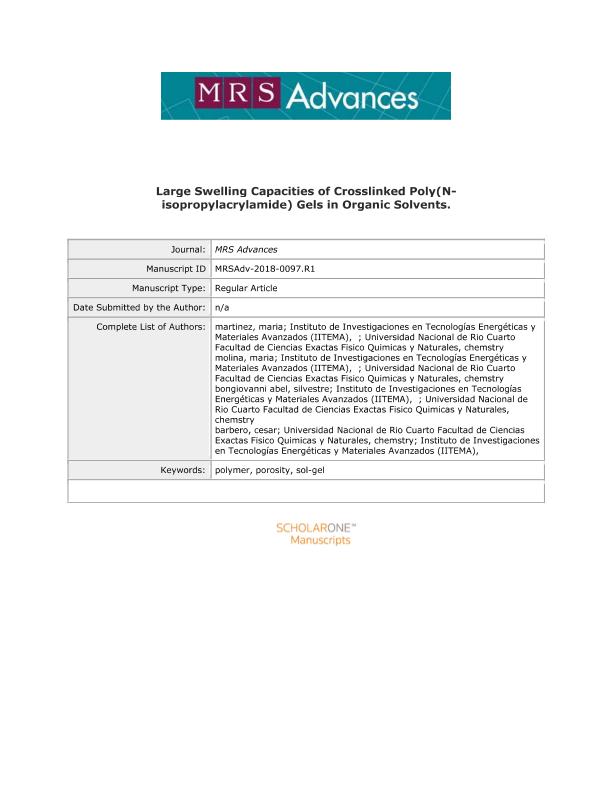Mostrar el registro sencillo del ítem
dc.contributor.author
Martinez, María Victoria

dc.contributor.author
Molina, María Alejandra

dc.contributor.author
Bongiovanni Abel, Silvestre Manuel

dc.contributor.author
Barbero, César Alfredo

dc.date.available
2019-12-12T17:54:24Z
dc.date.issued
2018-04
dc.identifier.citation
Martinez, María Victoria; Molina, María Alejandra; Bongiovanni Abel, Silvestre Manuel; Barbero, César Alfredo; Large swelling capacities of crosslinked poly(N-isopropylacrylamide) gels in organic solvents; Materials Research Society; MRS Advances; 3; 63; 4-2018; 3735-3740
dc.identifier.issn
2059-8521
dc.identifier.uri
http://hdl.handle.net/11336/92062
dc.description.abstract
PNIPAM hydrogels are widely studied materials which swell in a great extent in water and water like solvents (e.g. alcohols). The hydrophilic nature of PNIPAM networks is very attractive however it is an important disadvantage at the moment of encapsulating hydrophobic drugs, which minimize their use in other fields. In this work we studied the swelling in different solvent mixtures with water and also in pure nonaqueous solvents, some of them immiscible with water. Accordingly, PNIPAM gels swell strongly in highly polar solvents (e.g. chloroform) but it does not swell in slightly polar solvents (e.g.Toluene). The main interaction between the solvent and the polymer chain seems to involve the hydrogen bonding with the amide group, according to the calculated Hansen parameters (δh). It is possible to swell the gel in binary or ternary mixtures containing toluene. In that way, non-polar substances can be loaded inside the gel to change its properties. As a proof of concept, polyaniline (PANI) solubilized in chloroform using camphorsulfonate as solubilizing counterion. The obtained nanocomposites become sensitive to pH changing color and conductivity when exposed to basic or acidic aqueous solutions.
dc.format
application/pdf
dc.language.iso
eng
dc.publisher
Materials Research Society
dc.rights
info:eu-repo/semantics/openAccess
dc.rights.uri
https://creativecommons.org/licenses/by-nc-sa/2.5/ar/
dc.subject
POLYMER
dc.subject
POROSITY
dc.subject
SOL-GEL
dc.subject.classification
Físico-Química, Ciencia de los Polímeros, Electroquímica

dc.subject.classification
Ciencias Químicas

dc.subject.classification
CIENCIAS NATURALES Y EXACTAS

dc.title
Large swelling capacities of crosslinked poly(N-isopropylacrylamide) gels in organic solvents
dc.type
info:eu-repo/semantics/article
dc.type
info:ar-repo/semantics/artículo
dc.type
info:eu-repo/semantics/publishedVersion
dc.date.updated
2019-10-22T15:42:11Z
dc.journal.volume
3
dc.journal.number
63
dc.journal.pagination
3735-3740
dc.journal.pais
Estados Unidos

dc.journal.ciudad
Boston
dc.description.fil
Fil: Martinez, María Victoria. Universidad Nacional de Río Cuarto. Facultad de Ciencias Exactas Fisicoquímicas y Naturales. Departamento de Química; Argentina. Consejo Nacional de Investigaciones Científicas y Técnicas. Centro Científico Tecnológico Conicet - Córdoba; Argentina
dc.description.fil
Fil: Molina, María Alejandra. Universidad Nacional de Río Cuarto. Facultad de Ciencias Exactas Fisicoquímicas y Naturales. Departamento de Química; Argentina. Consejo Nacional de Investigaciones Científicas y Técnicas. Centro Científico Tecnológico Conicet - Córdoba; Argentina
dc.description.fil
Fil: Bongiovanni Abel, Silvestre Manuel. Consejo Nacional de Investigaciones Científicas y Técnicas. Centro Científico Tecnológico Conicet - Córdoba; Argentina. Universidad Nacional de Río Cuarto. Facultad de Ciencias Exactas Fisicoquímicas y Naturales. Departamento de Química; Argentina
dc.description.fil
Fil: Barbero, César Alfredo. Consejo Nacional de Investigaciones Científicas y Técnicas. Centro Científico Tecnológico Conicet - Córdoba; Argentina. Universidad Nacional de Río Cuarto. Facultad de Ciencias Exactas Fisicoquímicas y Naturales. Departamento de Química; Argentina
dc.journal.title
MRS Advances
dc.relation.alternativeid
info:eu-repo/semantics/altIdentifier/url/https://www.cambridge.org/core/product/identifier/S2059852118005947/type/journal_article
dc.relation.alternativeid
info:eu-repo/semantics/altIdentifier/doi/http://dx.doi.org/10.1557/adv.2018.594
Archivos asociados
